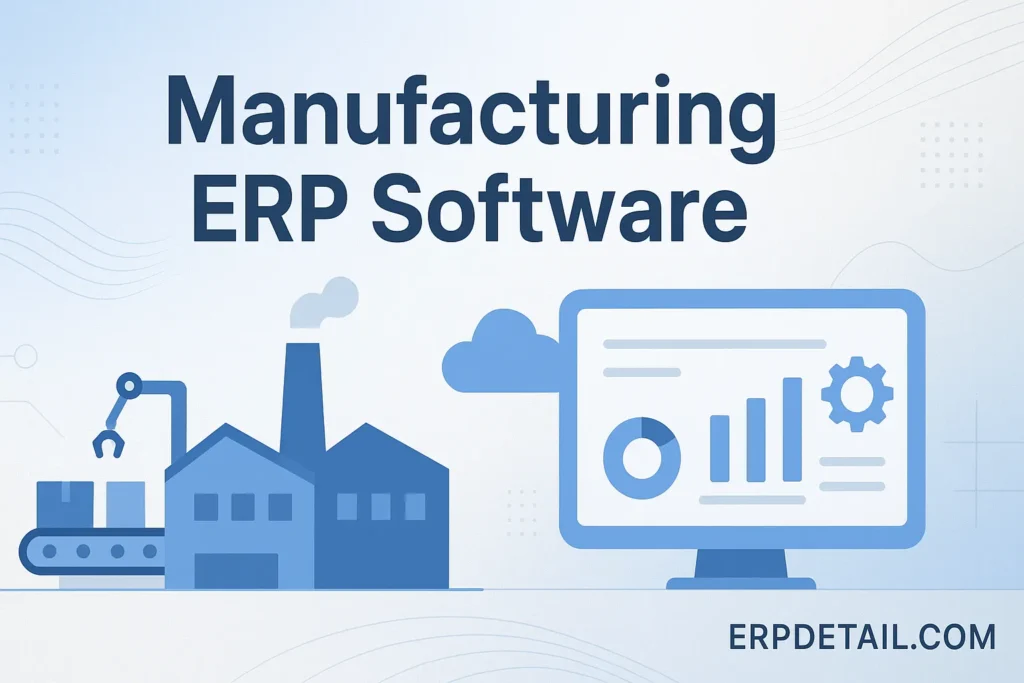
Manufacturing businesses today face growing challenges, from rising production costs to rapidly changing customer demands. Manufacturing ERP software has become the go-to solution for companies aiming to simplify operations, reduce errors, and remain competitive. This type of software allows manufacturing companies to connect every part of their workflow, from raw materials to final product delivery.
What is Manufacturing ERP Software?
At its core, manufacturing ERP software is a platform that unites different business processes into a single platform. These ERP solutions support planning, production, accounting, and reporting — all in one place. They help manage manufacturing operations efficiently while giving decision-makers access to real-time business data.
Core Features of Manufacturing ERP Software
Inventory Management
Effective inventory management is essential to keep inventory levels balanced, avoiding both shortages and excess stock. It ensures that raw materials are available when needed and that finished goods can be shipped on time.
Production Planning and Management
Modern ERP systems offer tools for production planning, production scheduling, and even production management. These features optimize production processes, reduce human error, and boost output quality.
Supply Chain Management
A strong supply chain management module allows smooth order management, timely order processing, and better order fulfillment. Businesses can manage work orders, bills of materials, and supplier relationships more effectively.
Quality Control
Maintaining high product quality is critical. Built-in quality control and quality assurance features reduce defects and ensure compliance with industry regulations.
Financial & Human Resources Management
ERP systems support financial management, handle accounts payable, and offer Human Resources tools to manage employees, track attendance, and support workforce planning.
Business Intelligence
With embedded business intelligence, companies gain business insights that highlight inefficiencies and opportunities for improvement. This data-driven approach enhances business agility and the bottom line.
Benefits for Manufacturers
Adopting manufacturing management software allows businesses to:
- Streamline operations and improve efficiency
- Reduce operational costs and achieve measurable cost savings
- Enhance customer service and overall customer experience
- Support compliance, change control, and engineering change tracking
How Manufacturing ERP Helps Businesses Grow
The right ERP helps scale entire business operations as demand grows. It also strengthens customer relationships and improves customer satisfaction. Many success stories show how companies transformed their manufacturing environments with ERP, leading to faster order fulfillment and happier customers. Manufacturing ERP Software
Choosing the Right ERP Solution
When selecting the Best ERP System, business leaders should focus on business needs and unique needs. Popular choices like Microsoft Dynamics, Microsoft Dynamics 365 Business Central, and SAP Business One provide robust capabilities for smallbusiness and large manufacturing enterprises alike. Others may explore Epicor Software or a cloud-based ERP system to support remote work and disaster recovery planning.
Future of ERP in Manufacturing
The future lies in cloud ERP systems, automation, and machine learning. These technologies will enhance data integration, support shop floor control, and offer predictive maintenance. Combined with document management and IT security, they make modern ERP systems highly reliable.
Conclusion
For manufacturing organizations seeking growth and efficiency, manufacturing ERP software is no longer optional — it’s a strategic necessity. By leveraging ERP tools and following best practices, manufacturers can future-proof their operations, improve service management, and deliver better results to their customers. Manufacturing ERP Software
How does ERP help with material requirements planning?
ERP systems include material requirements planning modules that calculate the exact raw materials and components required for production, helping avoid shortages and excess inventory.
Can ERP software manage work for machine shops?
Yes, a modern ERP system can be tailored for a machine shop, tracking work orders, schedules, and capacity to optimize production.
How does Manufacturing Execution System relate to ERP?
A Manufacturing Execution System (MES) works alongside ERP by monitoring shop-floor activities in real time. Integrating MES with ERP offers better data collection and Manufacturing ERP Software production insights.
Can ERP systems support accessibility?
Many ERP vendors now provide Accessibility Screen-Reader Guide features to ensure inclusive access for all users, including those with visual impairments.
Can I track service calls and issue reporting?
Yes, ERP systems with service management modules allow businesses to log service calls, track resolutions, and maintain issue reporting for quality and compliance purposes.
Do ERP vendors require my contact information?
When signing up for demos or trials, you may be asked for basic contact details like Business Email, First Name, and Phone Number so that vendors can follow up on your request and recommend the best fit solution.
